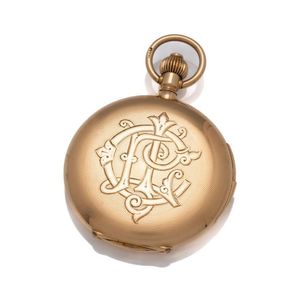Antique 18ct Gold Minute Repeater Pocket Watch
An antique 18ct gold minute repeater pocket watch, full hunter case with white dial, Roman numerals, blued hands, subsidiary seconds, stem wind and set 17 jewell Swiss movement, unsigned,18ct gold cuvette, engine turned case, front panel with engraved monogram, back engraved with a griffin, case size 48 mm, wt. 88.6g, working.
You must be a subscriber, and be logged in to view price and dealer details.
Subscribe Now to view actual auction price for this item
When you subscribe, you have the option of setting the currency in which to display prices to $Au, $US, $NZ or Stg.
This item has been sold, and the description, image and price are for reference purposes only.
- Engine Turned - Engine turning is a decorative technique used on metal surfaces to create intricate curving or geometric pattern. The process involves cutting a series of lines into the surface of the metal using a rose engine or decoration lathe which rotates the metal as it cuts, allowing the operator to create a repeating pattern that covers the entire surface. The resulting surface has a shimmering, reflective quality that is often described as "engine turned." Where an engine turned item has been enamelled, the term used to describe the decoration is usually guilloche.
Engine turning was originally developed to decorate metal objects such as firearms, scientific instruments, and other metal objects that required precise and elegant design. - Hunter - A hunter pocket watch is the type where the case includes a spring-hinged circular metal lid or cover, that closes over the glass face of the watch, protecting it from dust, scratches and other damage or debris. The majority of antique and vintage hunter-case watches have the lid-hinges at the 9 o?clock position, suiting the right handed user.
- Movement - The technical name for the workings of a clock or watch, and does not include the dial or case.
- Griffin / Griffon / Gryphon - A griffin, also known as a griffon or gryphon, is a mythical creature with the body of a lion and the head of an eagle. It is typically depicted as a powerful and majestic beast, with the body and legs of a lion and the head, wings, and talons of an eagle. The griffin is widely recognized as a symbol of strength, courage, and guardianship, and has been used in a variety of cultures throughout history.
In ancient mythology, the griffin was often associated with the gods and was considered a symbol of divine power. In ancient Greece, for example, the griffin was associated with the sun god Helios, while in ancient Egypt, it was associated with the goddess Hathor. In medieval European heraldry, the griffin was used as a symbol of strength, valour, and protection, and was often featured on the coats of arms of noble families.
This item has been included into following indexes:
